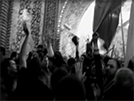Verse145
- Details
- Hits: 2903
(145) وَلَئِنْ أَتَيْتَ الَّذِينَ أُوْتُواْ الْكِتَابَ بِكُلِّ آيَةٍ مَّا تَبِعُواْ قِبْلَتَكَ وَمَا أَنتَ بِتَابِعٍ قِبْلَتَهُمْ وَمَا بَعْضُهُم بِتَابِعٍ قِبْلَةَ بَعْضٍ وَلَئِنِ اتَّبَعْتَ أَهْوَاءهُم مِّن بَعْدِ مَا جَاءكَ مِنَ الْعِلْمِ إِنَّكَ إِذَاً لَّمِنَ الظَّالِمِينَ
145. " And even if you were to bring every Sign to those who have been given the (earlier) Book, they would not follow your Qiblah, nor would you be a follower of their Qiblah, neither are they the followers of each other's Qiblah. And if you follow their desires after the knowledge that has come to you, then you will surely be of the Unjust.
Commentary :
They will Never be Content !
Commenting on the previous verse it was described that the ' People of the Book ' knew that the change of the Qiblah from the direction of Jerusalem to the direction of the Sacred Mosque not only was not an objection to the authenticity of the Prophet of Islam (p.b.u.h.), but that it was one of the signs of his rightfulness to prophethood, because they had learned through their religious books that the Apostle of Islam (p.b.u.h.) would pray towards the directions of two Qiblahs. But their vain religious fanaticisms did not let them accept the fact.
In principle, until when a person has not made a decision on a subject yet, by bringing proof, reasons, logic, and miracles for him, he might be made to understand the fact or the fact, itself, might be proved and be manifested to him and consequently, he changes his belief. But, when formerly he has decidedly confirmed his position, especially in the case of a zealous or ignorant person, it is not at all possible to change his mind.
So the Qur'an decisively says:
"And even if you were to bring every Sign to those who have been given the (earlier) Book, they would not follow your Qiblah, ..."
Therefore, do not tire yourself, for they will never surrender to the truth because the truth-seeking soul has died in them. Unfortunately, all of the Divine prophets were faced with such persons who were either of the rich puissant ones, or of the deluded and mammonish scholars, or of the ignorant zealous laymen. Then, it adds :
"... nor would you be a follower of their Qiblah, ..."
That is, if they think that, with their sayings and uproars, the Muslims' Qiblah may change again, they are mistaken. This Qiblah is permanent and it is the final everlasting Qiblah for all Muslims. This kind of speaking is, in fact, one of the ways of concluding the reproaches of opponents by standing firm and proving that those futile uproars will not change anything.
Then it adds that they are so fanatic in their creed that:
"... neither are they the followers of each other's Qiblah. ..."
Neither would the Jews follow the Christian's Qiblah nor would the Christians follow the Jews' Qiblah.
Then, again for more emphasis, it warns the Prophet (p.b.u.h.):
... And if you follow their desires after the knowledge that has come to you, then you will surely be of the Unjust.
Such warnings which are stated in the form of conditional sentenes, addressing the Prophet (p.b.u.h.) are frequently seen in the Qur'an, the purpose of which is threefold:
The first is that all know that, regarding the law of Allah, there is no difference between the servants of Allah and even the Divine prophets are included under those laws, therefore, if, for the sake of argument, the holy Prophet (p.b.u.h.), too, were to delude from the Truth, he would also be involved with the Lord's punishment, though such a supposition is impossible concerning the prophets (a.s.) with their Faith and immence knowledge and whose ranks of virtue are known. (And, as it was stated before, a conditional proposition does not necessarily verify the existence of a protasis.)
The second thing is that, taking into consideration the above circumstance, other people would think about their own situations and know that when the Prophet (p.b.u.h.) is being warned, then how much more they should be careful about their responsibilities and duties. They must never follow their enemies' perverted desires or give attention to their uproars.
The third aim is to make it clear that the holy Prophet (p.b.u.h.), too, has no right on his own to change anything in Allah's ordinances. It is not so that any one can collide or come to terms with him, since he is a servant, too, and obedient to His Command.










![take advantage of your [present] time](/en/media/com_hwdmediashare/files/99/f5/fb/5293162f4d04afb1ed8da3034e984340.jpg)
